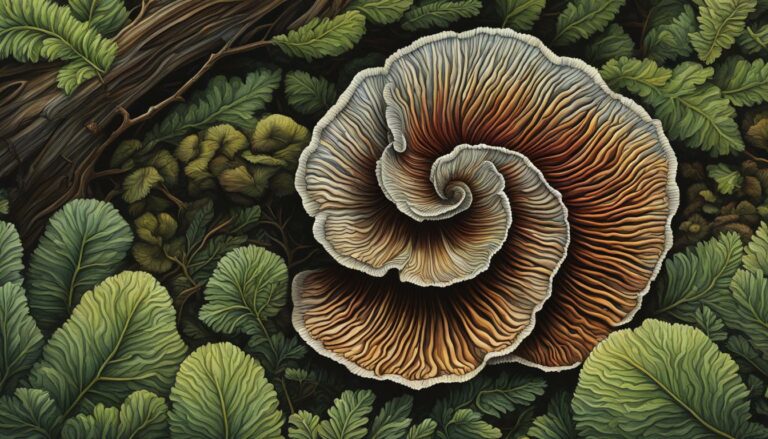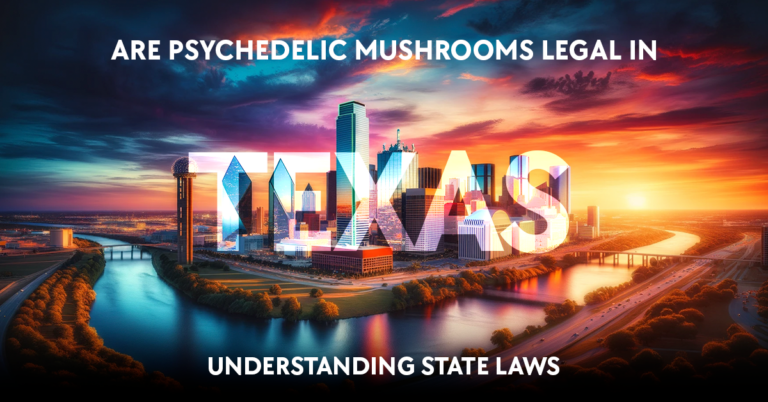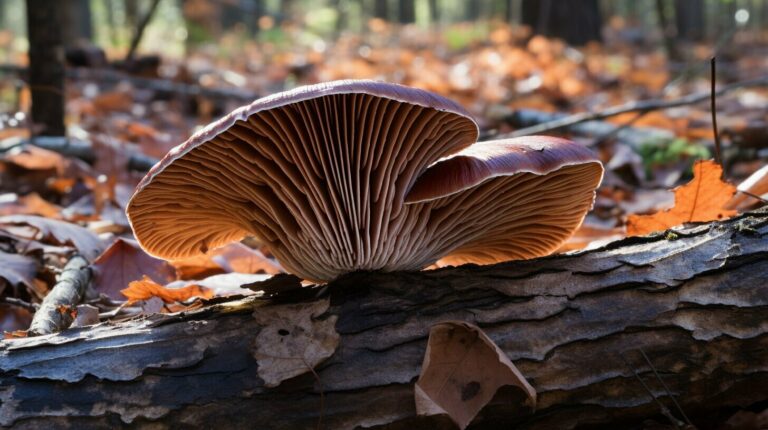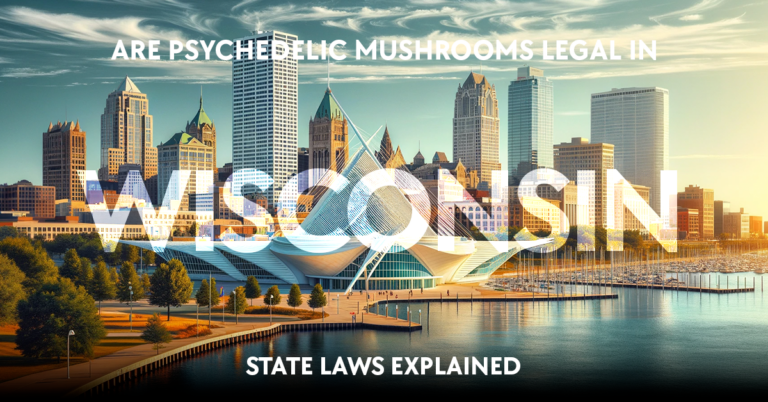Understanding the legal landscape of psychedelic substances can be complex, and if you’re curious about the status of psychedelic mushrooms in Illinois, it’s essential to look at the current laws. In Illinois, psilocybin—the hallucinogenic compound found in psychedelic mushrooms—is classified as a Schedule I controlled substance. This means that it is illegal to possess, distribute, or manufacture it under state and federal law. However, there have been discussions and movements advocating for the therapeutic potential of psilocybin, which have influenced legal perspectives in various jurisdictions.
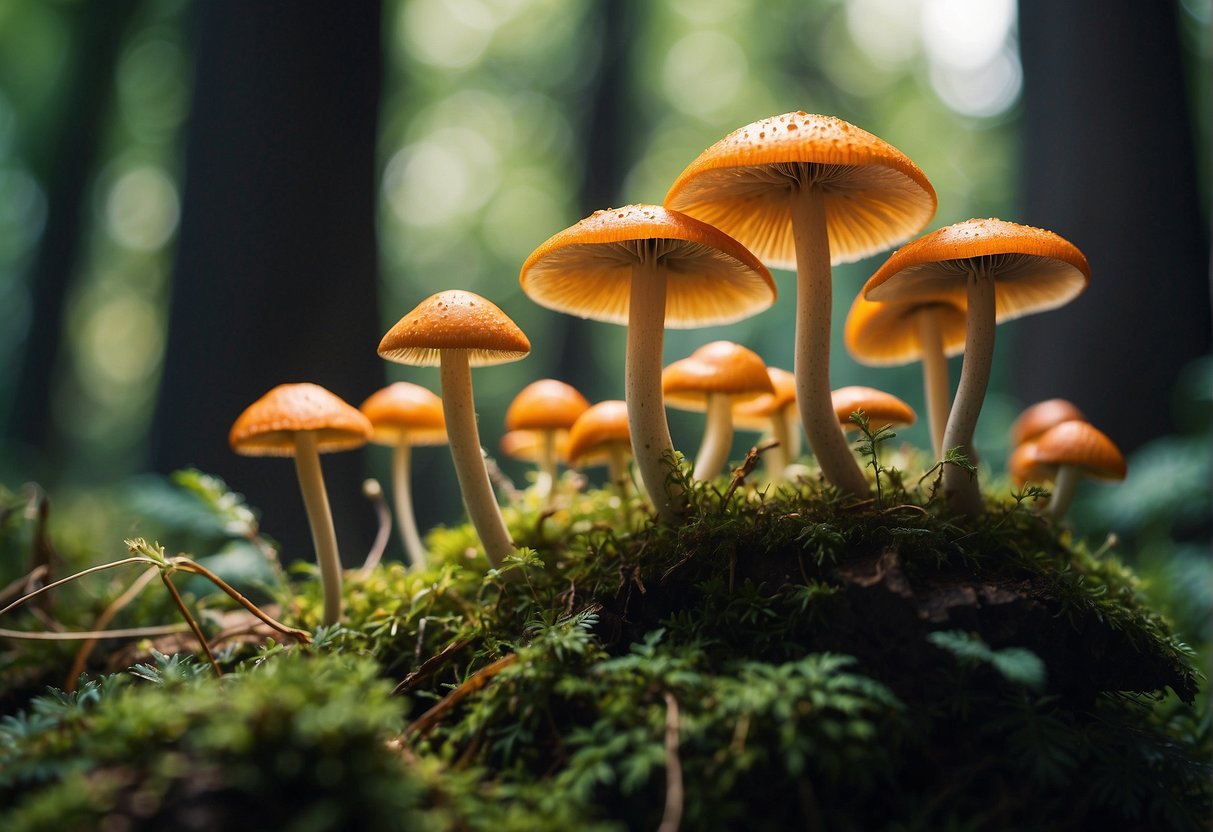
Recent legal changes in some states have shifted the conversation about psychedelic mushrooms, addressing their potential benefits and reconsidering their legal status. While Illinois has taken some progressive steps with cannabis legalization, it’s important to note that these changes do not extend to psychedelic mushrooms. The use, sale, and cultivation of psychedelic mushrooms remain prohibited, and while you may come across news of regulatory reforms in other states or countries, Illinois has not yet followed suit.
Legal Status of Psychedelic Mushrooms in Illinois
Table of Contents
https://www.youtube.com/watch?v=RRaVFIP8g9E&embed=true
In Illinois, psychedelic mushrooms, also known colloquially as shrooms or by their scientific identifier psilocybin mushrooms, are currently classified as a Schedule I controlled substance. This classification is in line with the federal Controlled Substances Act, which indicates that these substances have a high potential for abuse and no accepted medical use.
- Decriminalization Efforts: There have been movements to decriminalize psychedelic plants and fungi, psilocybin mushrooms included. However, as of the last update, no statewide law has passed to decriminalize or legalize their possession or use.
- Legal Consequences: Possessing or selling psilocybin mushrooms can lead to criminal charges. If you’re dealing with law-related inquiries, consulting with a lawyer familiar with drug policy might be prudent.
| Entity | Status in Illinois |
|---|---|
| Psilocybin Mushrooms | Illegal (Schedule I Controlled Substance) |
| Legalization | Not legalized |
| Decriminalization | No statewide decriminalization enacted |
| Law Enforcement | Enforced according to state and federal law |
| Legislation | No current legislation passed for legalization |
Bear in mind that while some municipalities may have local policies that deprioritize enforcement, this does not equate to state-level legalization or decriminalization. Legal interpretations and enforcement can also vary by jurisdiction, and actions by the Supreme Court may influence future applications of the law. Always keep abreast of the latest changes in legislation as they can directly impact the legal status of such controlled substances.
Decriminalization Efforts and Legislation
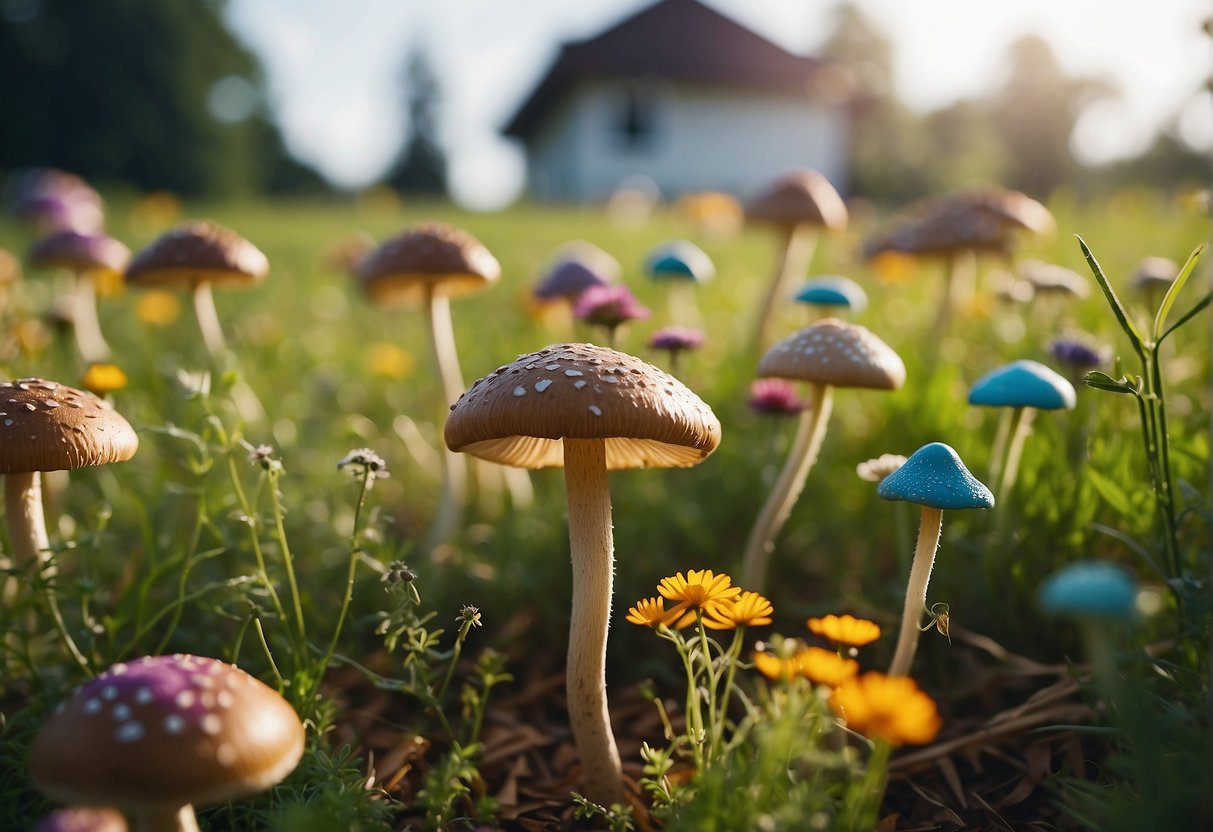
In recent years, you’ve likely heard of the growing movement toward reevaluating the legal status of psychedelic substances. In particular, the state of Illinois has seen significant discussions around the decriminalization and potential future legislation governing the use of psychedelic mushrooms.
Decriminalization in Illinois
With Chicago leading the way, Illinois has taken steps toward the decriminalization of psychedelic substances. A resolution was passed to decriminalize the possession of entheogenic plants, which notably includes psychedelic mushrooms. This resolution aims to redirect law enforcement priorities, reducing penalties associated with these substances.
Illinois Compassionate Use of Natural Plants and Fungi Act
In a move that signals a shift in perception towards psychedelics, Illinois legislators have introduced the Illinois Compassionate Use of Natural Plants and Fungi Act. This act seeks to establish access to plants and fungi commonly used for therapeutic and medicinal purposes, placing an emphasis on psilocybin, the active compound found in magic mushrooms.
Nationwide Decriminalization Movements
While Illinois is making progress, it’s part of a broader pattern seen across the United States. Cities like Denver, Seattle, Ann Arbor, Santa Cruz, and states such as Oregon have implemented or voted on measures to decriminalize or even legalize psychedelic substances for various uses. This wave of reform represents a notable pivot from the stringent policies that dominated the war on drugs era, with ballot measures gaining increasing support from both the public and local legislatures.
Medical and Therapeutic Use of Psychedelics
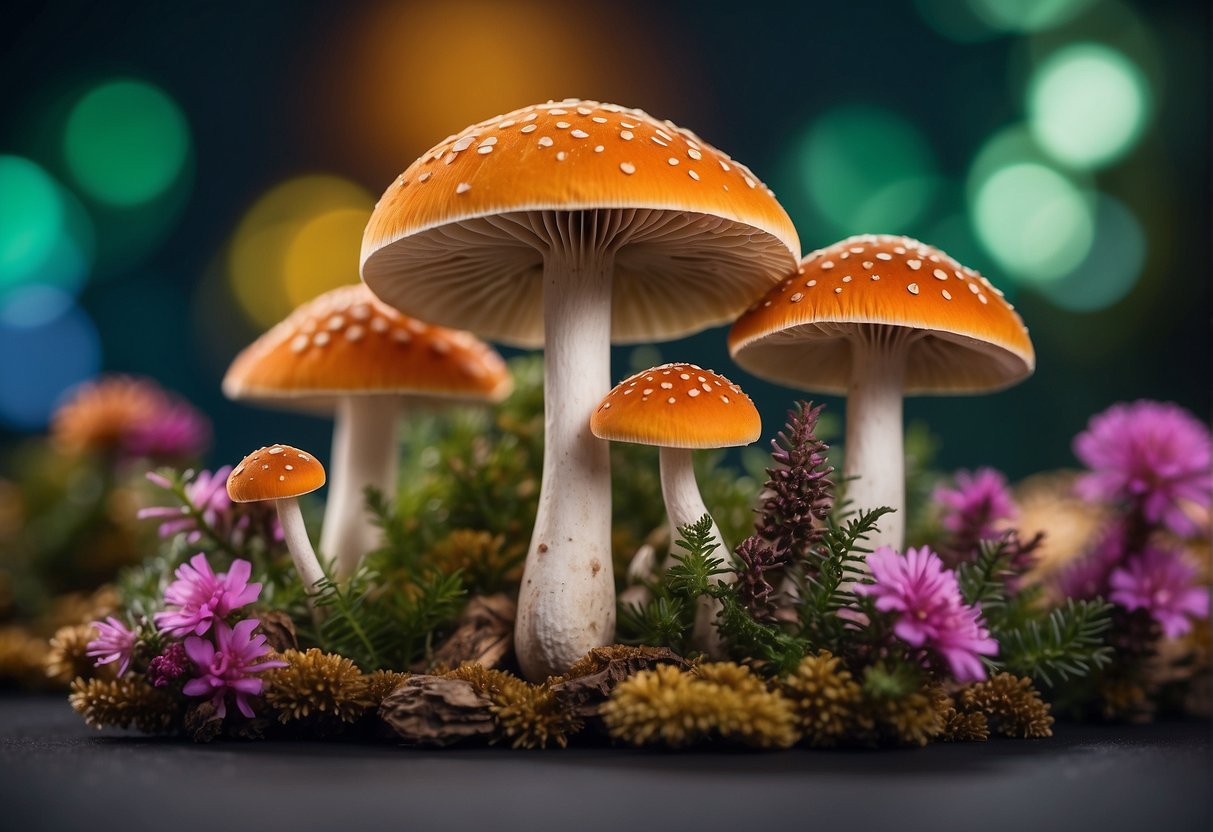
Exploring the legal landscape in Illinois, you’ll find a burgeoning interest in the medicinal benefits of psychedelics, particularly concerning mental health treatments. Let’s delve into the research and regulations surrounding psychedelic mushrooms for therapeutic use.
Research on Psychedelic Mushrooms
Psychedelic mushrooms, primarily containing psilocybin, have been subject to in-depth research. Institutions like the University of Chicago have been at the forefront, examining their potential to treat various mental health conditions. This research often focuses on their psychoactive properties which can induce profound changes in consciousness, considered beneficial in therapeutic settings.
Psilocybin for Mental Health Treatment
Psilocybin, the active compound in psychedelic mushrooms, is gaining recognition for its potential to treat depression, anxiety, PTSD, and addiction. Medical professionals and therapists are scrutinizing its efficacy in controlled settings, noting significant benefits for mental health. Initiatives like the Sana Healing Collective aim to integrate psychedelics into holistic therapy practices, under the watchful eye of mental health professionals.
Regulations for Therapeutic Use
The legal framework in Illinois is evolving to potentially accommodate psilocybin for therapeutic use. As such, institutions like the Illinois Psilocybin Advisory Board and the Department of Public Health are pivotal in shaping policies around these controlled substances. Health Service Centers may become pivotal locations for regulated psychedelic therapy, subject to state laws and regulatory boards’ recommendations.
Potential Risks and Legal Penalties
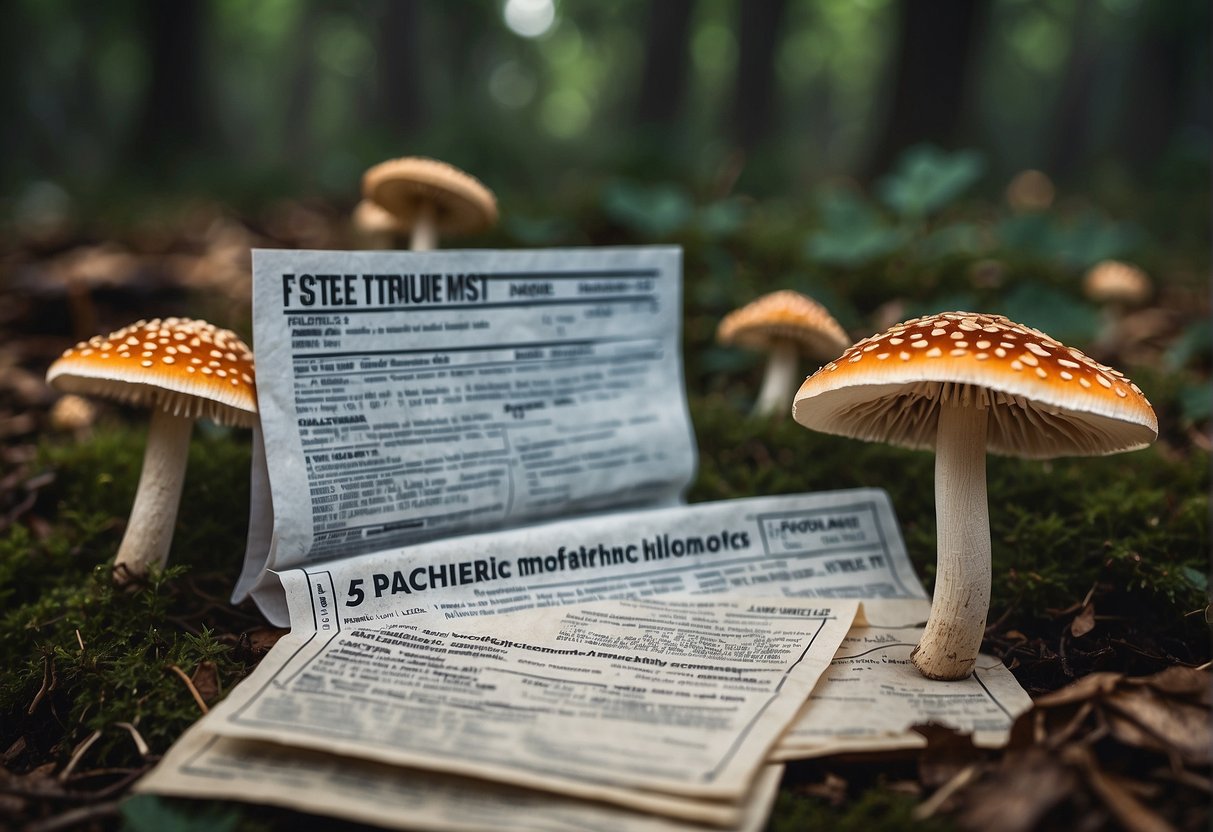
Understanding the legal ramifications and potential health consequences of psilocybin mushroom use is crucial if you’re considering their consumption in Illinois. The state’s stance involves specific statutes that address possession, use, and distribution, coupled with health advisories regarding their impact on mental health.
Criminal Charges for Possession and Use
In Illinois, psilocybin mushrooms fall under the category of a Schedule I controlled substance. If you’re found in possession of these hallucinogenic drugs, you face criminal penalties. For small amounts, the legal penalties could range from fines to incarceration. On the other hand, possession of larger quantities may result in more severe charges, equating to felonies with the potential of substantial jail time and greater fines. For instance, under state law, possession of more than 200 grams can result in a penalty of 6-30 years in prison and fines up to $25,000. Engaging in activities such as selling or trafficking can incur even harsher repercussions, for they are not only criminalized but also aggressively prosecuted.
Health Risks and Contraindications
While psilocybin mushrooms can induce hallucinations and are sought after for their psychedelic effects, they also pose health risks. Your mental health can be significantly impacted, especially if you have a history of mental health issues or a predisposition to drug addiction. Acute reactions can include paranoia, anxiety, and dangerous behaviors while under the influence. Long-term use raises concerns about addiction and potential harm to cognitive functions. It’s important to note that medical supervision is absent in non-clinical settings, increasing the risk of uncontrolled, sometimes severe, adverse reactions. Additionally, combining psilocybin with other substances could elevate the risk of harm or even lead to unforeseen health complications.
Societal Impact and Public Opinion
In this section, you’ll find a focused discussion on how public perception and issues of social equity intertwine with the legal status of psychedelic mushrooms in Illinois.
Public Perception of Psychedelics
Public opinion around psychedelic drugs has been undergoing significant shifts. Historically, substances such as psilocybin, the psychoactive component in magic mushrooms, faced staunch opposition due partly to the war on drugs. Yet, recent studies and societal trends suggest a softening stance. Surveys indicate a growing acceptance that could be linked to increased recognition of potential therapeutic benefits, highlighted by initiatives to reevaluate their legal status in states like Illinois.
In conversations about psychedelics, you might have noticed a recurring focus on their potential for personal transformation and mental health treatment. This has prompted some researchers and advocates to suggest a reexamination of existing drug laws, which could alter society from a legal and cultural perspective as detailed in the discussion on the envisioning of legal psychedelic worlds in the United States.
Psychedelics and Social Equity
The topic of equity emerges as a fundamental concern when discussing the legalization of psychedelic substances. The social impact of the war on drugs has been far-reaching, disproportionately affecting marginalized communities. In their effort to legalize psychedelic plants and substances, various states, including Illinois, are now considering not only the therapeutic and spiritual value of these substances but also the importance of social equity in their legislative approaches.
For instance, the development of policies in Illinois reflects an awareness of these disparities and an intention to correct them through legal reform. Advocacy for substances like ibogaine earmarks a notable example, where efforts to reschedule the psychedelic compound are layered with the goal of addressing the needs within OUDs in the state and creating a more equitable social terrain.
Regulatory Aspects and Future Prospects
If you’re following the legal landscape of psychedelic mushrooms in Illinois, you need to be aware of the intricacies of current regulations and what changes might be on the horizon. The legal status of substances like psilocybin, the psychoactive compound in psychedelic mushrooms, is complex and continuously evolving.
Licensing and Manufacturing
Illinois treats psilocybin-containing mushrooms as a Schedule I controlled substance, indicative of a high potential for abuse and no recognized medical use. Therefore, manufacturing and distribution of these substances without appropriate licensing can lead to serious legal consequences. At the time of this writing, no framework specifically for the licensing of psilocybin manufacturing exists in Illinois, meaning there are no legal avenues to produce or procure these substances within the state for personal use.
Psychedelic Research and Future Policies
Recent psychedelic research points to potential psychiatric uses, prompting discussions about re-evaluating the legal status of psychedelic drugs including psilocybin. Illinois law does not currently provide mechanisms for legal psychedelic research. However, the climate is shifting, and there’s an increasing number of scientists advocating for changes in legislation to allow for medical and therapeutic research. If policies change, Illinois could see legislation allowing for controlled and regulated research environments. Future prospects depend largely on outcomes of research and the movement of public opinion, which could eventually culminate in changes at the ballot box or influence the state legislature to amend current laws.
Comparative Legal Perspectives
As you explore the legality of psychedelic substances, specifically psilocybin-containing mushrooms, it’s important to understand how laws differ from one jurisdiction to another. The comparative legal perspectives here focus on the varying legislative frameworks in Illinois compared to other states and in the scope of international law.
Illinois vs. Other States
In Illinois, while marijuana has been legalized, the current legal stance on psilocybin mushrooms remains strict; they are classified among regulated substances and are illegal to possess, sell, or cultivate. However, cities like Denver, Colorado and Oakland, California have taken a progressive approach, having decriminalized the possession and use of these mushrooms. Each state’s stance on substances like LSD, DMT, and MDMA varies, often mirroring their approach to psilocybin regulation. Georgia and Idaho maintain rigorous laws against such substances, with no indication of decriminalization efforts yet.
| State | Psilocybin Legal Status | Other Psychedelics Legal Status |
|---|---|---|
| Illinois | Illegal | Illegal |
| California | Decriminalized* | Illegal |
| Colorado | Decriminalized* | Illegal |
| Georgia | Illegal | Illegal |
| Idaho | Illegal | Illegal |
*Decriminalized in certain cities.
States implementing psychedelic therapy programs, such as California and Colorado, are also paving the way for potential changes in the legal landscape, largely due to the therapeutic potential of psychedelics like ketamine, which is legal for such use.
International Legal Landscapes
On the international stage, laws surrounding psychedelics can vastly differ. While substances like psilocybin, mescaline, and ayahuasca might be strictly prohibited in countries like the United States under federal law, there are places where such regulations are less stringent. For example, countries like the Netherlands tolerate the use of “magic truffles,” which contain psilocybin, whereas ayahuasca ceremonies are legal and culturally significant in parts of South America.
When considering international law, the United Nations conventions classify many psychedelics as controlled substances. However, international law also acknowledges the sovereignty of nations, thereby allowing countries like Portugal, which has decriminalized all drugs, to adopt policies that are significantly different from those of the United States.
| Country | Psilocybin Legal Status | Psilocybin for Therapeutic Use |
|---|---|---|
| Netherlands | Tolerated | Not explicitly regulated |
| Portugal | Decriminalized | Decriminalized |
| United States | Illegal (federal level) | Illegal, except in research |
In conclusion, the legality of psilocybin and other psychedelics varies widely, and it’s crucial for you to be aware of these differences to understand the broader context of psychedelic substance regulation.
Support Networks and Resources
If you’re seeking information or support concerning the legal status of psychedelic mushrooms in Illinois, several resources and networks are available to guide you. It’s essential to understand your legal rights and find reliable information on harm reduction to navigate this emerging field effectively.
Legal Advice and Representation
When it comes to legal support, finding a qualified lawyer experienced in drug policy can make a significant difference. These professionals provide legal advice and can help represent your interests if you’re facing legal challenges related to psychedelic use. Legal defense organizations and service centers may also have referrals for legal representation specializing in this area.
- Resources where you can seek legal assistance:
- American Bar Association – Find legal representation from their directory.
- Law school clinics – Local universities may offer services or guidance.
Education and Harm Reduction Resources
Educating yourself about the safe use of psychedelics is crucial. Harm reduction groups and educational resources can offer you strategies to minimize risks. Mental health resources and substance abuse support networks can provide additional support and guidance. Community-based organizations often have ties to broader psychedelic support networks.
- Places to obtain educational information and harm reduction advice:
- Local health departments – Offering educational pamphlets and safe usage guidelines.
- Online platforms – Providing webinars, articles, and forums for community support.
Cultural and Historical Context
Psychedelic mushrooms hold a complex place in both traditional practices and modern cultural shifts, where their legality often reflects evolving perspectives on their use.
Psychedelics in Traditional Practices
Psychedelic substances, including psilocybin mushrooms, ayahuasca, mescaline, and DMT, have been integral to religious and ceremonial activities across various cultures. For centuries, these substances have been utilized for their hallucinogenic properties, primarily for spiritual and healing purposes. In the context of traditional practices, they often serve as conduits for spiritual exploration and connection to the divine. Indigenous communities in regions like South America and Mexico have used these psychedelics in their rituals, underpinning their significant role within the cultural context.
Modern Cultural Shifts
In recent decades, there has been a modern culture shift regarding the perception of psychedelic substances, including magic mushrooms and LSD. Once associated with the countercultural movements of the 1960s that challenged mainstream societal norms, these substances are now being explored for their therapeutic potential. Scientific research has begun to illuminate the possible benefits of psychedelics in treating mental health disorders which has influenced cultural shifts in their legal status. Although many of these substances remain illegal under federal law, certain areas, like Oregon, have taken steps to decriminalize or legalize their use, reflecting a significant shift in psychedelic culture and its acceptance.
Conclusions and Key Takeaways
When examining the legal status of psychedelic mushrooms in Illinois, it’s important for you to understand the current legislation. As of now, psychedelic mushrooms, which contain the psychoactive compound psilocybin, remain illegal at the federal level in the United States. This means that, irrespective of state laws, the federal law prohibits the manufacture, distribution, and possession of these substances.
Regarding Illinois specifically, psychedelic mushrooms are not legal. They are classified as Schedule I drugs under the Illinois Controlled Substances Act, indicating that they have a high potential for abuse and no accepted medical use. Your understanding of this classification helps to clarify why the possession, sale, or cultivation of these mushrooms can result in legal consequences within the state.
However, it’s noteworthy that public opinion on psychedelic mushrooms is evolving, with some advocating for their medicinal potential, especially in the context of mental health treatments. This shift could potentially influence future decisions regarding their legality.
When discussing psychedelic mushrooms and their legal framework, always prioritize accurate, current information, and be aware that legal interpretations can vary. Before making any decisions that could impact your legal standing, consult with a legal professional who can provide advice based on the latest developments in the law.
Keep these key points in mind:
- Federal law prohibits psychedelic mushrooms.
- In Illinois, they are classified as Schedule I controlled substances.
- Public opinion is shifting, which may affect future legislation.
- Always seek legal counsel for the most up-to-date advice.
References and Further Reading
When exploring the legality of psychedelic mushrooms in Illinois, several resources provide valuable insights into recent changes and current legal perspectives. Below is a curated list to assist with your further inquiry:
Legal Documents and Government Resources:
You may want to consult the latest legislative documents and resolutions from Illinois state and local government databases for the most current legal standings.
Books:
- “Psychedelic Mushroom Legal Defenses” offers a perspective on legal arguments around psychedelic substances, with some focus on state laws that might be applicable. Learn more about legal defenses.
- “Sacred Mushroom of Visions: Teonanácatl” provides cultural and historical context without detailing cultivation, for understanding the broader implications of psilocybin mushroom use. Explore the historical context.
Academic Journals and Clinical Trials:
There have been many clinical trials examining the therapeutic applications of psychedelic mushrooms. To find out about recent scientific findings and discussions on legalization, look for publications in journals like the Journal of Psychopharmacology.
Publications and Research Studies:
- Various studies, such as the expansion of psychedelic research in 2019, offer insights into regional decriminalization efforts and research trends. Read about the latest research and deregulation efforts.
- You can delve into the social implications and possible futures of legal psychedelic substances in the United States with publications like “Socio-psychedelic imaginaries.” Investigate the societal impact of legalization.
Whether your interest is academic, legal, or personal, these references should guide you to more detailed information on the subject of psychedelic mushrooms and their legal status in Illinois.
Contact Information
When seeking information about the legality of psychedelic mushrooms in Illinois, it’s important to know the correct points of contact. Specifically, you might need to reach out to state and local government offices or connect with advocacy groups for guidance on public health policies or community services related to psychedelic substances.
State and Local Government
Illinois Department of Public Health
Phone: (217) 782-4977
Website: Illinois Department of Public Health
Explore the state’s official resources for information on public health laws and regulations. They can provide guidance on the legality of psychedelic mushrooms in Illinois.
Local Government Offices
Check your local government’s official website or contact local health departments as regulations can vary by municipality.
Advocacy Groups
Drug Policy Reform Organizations
Research organizations advocating for changes in drug policy. They may have updates on the legal status of psychedelic substances.
Public Health Advocacy Groups
Look for groups specializing in public health for community services information. They can offer insights into local initiatives and support systems.
Frequently Asked Questions
In this section, you’ll find precise answers to common queries regarding the legal status of psilocybin mushrooms in Illinois.
What is the current legal status of psilocybin mushrooms in Illinois?
Currently, psilocybin mushrooms are classified as a Schedule I controlled substance in Illinois, making their sale, possession, and distribution illegal under both state and federal law.
Has there been recent legislation regarding the decriminalization of psychedelic mushrooms in Illinois?
No recent legislation has been passed in Illinois to decriminalize psychedelic mushrooms. However, there have been discussions and movements at various levels that indicate a growing interest in this subject.
Can individuals possess or grow psilocybin mushrooms without violating Illinois state laws?
No, individuals cannot legally possess or grow psilocybin mushrooms in Illinois without violating state laws due to their Schedule I classification.
Are there any initiatives or proposals in Illinois aimed at changing the legality of psilocybin mushrooms?
There has been a push by some advocacy groups for initiatives aimed at changing the legal status of psilocybin mushrooms in Illinois, but no formal proposals have been adopted as law.
Is there a distinction in Illinois law between the use of psychedelic mushrooms for personal vs. medical purposes?
Illinois law does not currently distinguish between the use of psychedelic mushrooms for personal or medical purposes; they remain illegal regardless of the intended use.
What are the potential legal consequences for being caught with psychedelic mushrooms in Illinois?
The legal consequences for being caught with psychedelic mushrooms in Illinois can include fines, arrest, and prosecution, with penalties varying based on the amount in possession and the intent for use or distribution.


